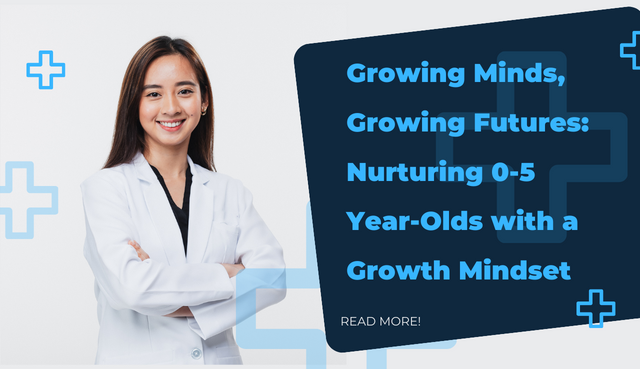The foundations for learning and growth are set throughout a child’s formative years. A growth mindset—a theory that emphasizes the conviction that one can learn and improve through effort and perseverance—must be fostered during these formative years, from birth to age five. In this article, we’ll examine the importance of fostering a growth mindset in early children and provide you with helpful advice on how to do so. Let’s go out on a mission to provide our young students with the power of a development mentality.
What Is a Growth Mindset?
Let’s first define a growth mindset in order to better understand how to foster one in kids. A growth mindset is the idea that aptitudes and intellect can be developed through commitment, toil, and education. It was first proposed by psychologist Carol Dweck. A fixed mentality, on the other hand, holds that skills are unchangeable and rigid. Growing up with a growth mindset may have substantial and long-lasting implications on how children approach learning and problems.
Fostering a Growth Mindset: Key Strategies
1. Praise Effort, Not Intelligence : Instead of just telling young children they are smart, praise them for their efforts and approaches. For instance, consider stating, “You worked really hard on that!” instead of, “You’re so smart!”
2. Embrace Challenges: Encourage kids to view obstacles as chances to develop and learn. Emphasize that it’s alright to try again and that making errors is a necessary part of learning.
3. Model a Growth Mindset : Children frequently pick up lessons from examples. Show them in your own life that you, too, are prepared to learn from your mistakes and progress by exhibiting a growth mindset.
4. Encourage Curiosity : Encourage kids’ innate curiosity by giving them chances for exploration and learning. Engage in activities that encourage critical thinking and problem-solving and ask open-ended questions.
5. Set Realistic Expectations : As they mature, encourage them to create objectives they can achieve. Divide more difficult activities into smaller, more doable segments.
6. Provide Constructive Feedback : Instead of expressing general praise or criticism when giving feedback, concentrate on particular areas that might be improved. Encourage them to evaluate their performance and consider how they might improve going forward.
The Role of Early Childhood Education

An important factor in encouraging a development mindset in young children is early childhood education. Preschools and childcare facilities can offer the perfect setting for successfully putting these principles into practice. The following are some strategies early childhood educators may use to promote a development mindset:
- Creating a Supportive Learning Environment: Effective education is built on creating a conducive learning environment. It entails designing environments and learning opportunities that encourage learners’ interest, participation, and sense of belonging. Students feel secure to ask questions, make errors, and fully explore their potential in such a setting. Teachers may encourage children to succeed academically and personally by creating a supportive learning environment, which creates the foundation for lifetime learning and development.
- Promoting a “Can-Do” Attitude: Teachers may promote self-efficacy in students by speaking positively and encouraging them. Confidence-boosting statements like “You can do it!” and “I believe in you!” may go a long way.
- Incorporating Play-Based Learning: Play is an effective learning technique. Children have the chance to develop their creativity and problem-solving abilities in childcare programs that include play-based learning activities.
- Supporting Social and Emotional Growth: Children who are taught about emotions, empathy, and resilience are more likely to grow up with a growth mindset. To explore these ideas, educators might utilize tales and activities.
- Engaging Parents: One of the most important aspects of encouraging a child’s development attitude is involving parents. Teachers and other carers may foster a cooperative atmosphere that supports optimistic views on learning and resilience by establishing open lines of communication, exchanging knowledge on growth mindset techniques, and including parents in their children’s educational journeys. Children gain from constant reinforcement and support, both inside and outside of the classroom, when parents are actively involved in fostering a growth mindset at home. This increases the likelihood that they will succeed academically.
Conclusion: Cultivating a Growth Mindset from the Start
The foundations of a development mentality may be planted in a child’s early years. We can foster young learners who are self-assured, resilient, and ready to explore the world with curiosity and zeal by highlighting effort, accepting obstacles, and modeling a dedication to learning.
It’s vital to keep in mind that educators and parents play a critical part in this journey as we concentrate on encouraging the development mindsets of our young learners. Together, we can give the future generation the confidence that they can overcome challenges, adjust to change, and learn new things all the time.
Please explore our child care assignment services for additional information and support with early childhood education and childcare assignments. We are here to help you as you work to mold the future of our young students.
Ready to explore Child Care Assignment Help for your academic needs? Connect with Assignment Unlocked and access expert assistance to excel in your childcare studies and assignments. Your path to becoming an early childhood educator starts here!






